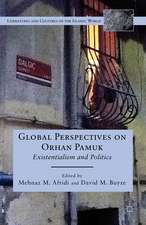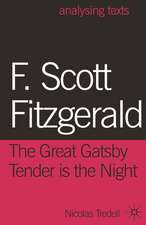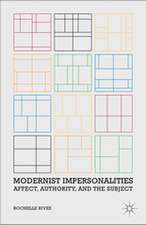The Literary and Cultural Rhetoric of Victimhood: Western Europe, 1970-2005
Autor F. Naqvien Limba Engleză Paperback – 9 apr 2008
| Toate formatele și edițiile | Preț | Express |
|---|---|---|
| Paperback (1) | 385.47 lei 6-8 săpt. | |
| Palgrave Macmillan US – 9 apr 2008 | 385.47 lei 6-8 săpt. | |
| Hardback (1) | 388.13 lei 6-8 săpt. | |
| Palgrave Macmillan US – 9 apr 2008 | 388.13 lei 6-8 săpt. |
Preț: 385.47 lei
Nou
Puncte Express: 578
Preț estimativ în valută:
73.76€ • 77.01$ • 61.05£
73.76€ • 77.01$ • 61.05£
Carte tipărită la comandă
Livrare economică 04-18 aprilie
Preluare comenzi: 021 569.72.76
Specificații
ISBN-13: 9781349536351
ISBN-10: 1349536350
Pagini: 264
Ilustrații: XII, 264 p.
Dimensiuni: 140 x 216 mm
Greutate: 0.35 kg
Ediția:1st ed. 2007
Editura: Palgrave Macmillan US
Colecția Palgrave Macmillan
Locul publicării:New York, United States
ISBN-10: 1349536350
Pagini: 264
Ilustrații: XII, 264 p.
Dimensiuni: 140 x 216 mm
Greutate: 0.35 kg
Ediția:1st ed. 2007
Editura: Palgrave Macmillan US
Colecția Palgrave Macmillan
Locul publicării:New York, United States
Cuprins
Sacrificial Victims: Sigmund Freud, Theodor Adorno and Max Horkheimer, Walter Benjamin Politics of Indifference: René Girard and Peter Sloterdijk Mediated Invisibility: Michael Haneke Apocalyptic Cosmologies: Christoph Ransmayr and Anselm Kiefer Melancholia is Moot: Return to Freud Impoverishment and Feminization: Friederike Mayröcker Television's Foreign Voices: Elfriede Jelinek A Domain of Sexual Struggle: Michel Houellebecq The Quest for the Sacred: Giorgio Agamben
Recenzii
'Fatima Naqvi's The Literary and Cultural Rhetoric of Victimhood is among the most theoretically nuanced and compelling treatments of the contemporary preoccupation with 'the victim' and 'victimhood' I have seen. It offers a focused and penetrating analysis of the recent proliferation of victim discourse in Western culture by engaging first with some of the most important philosophical, anthropological, and psychoanalytic work on the topic and then with complex literary and cinematic works in which the problem of sacrifice and victimization is central. This study is engaging, intelligent, lively, and well written.' - Eric Santner, Author of On Creaturely Life: Rilke, Benjamin, Sebald
'This book is a highly astute study of a current Western European rhetorical figure and cultural self-perception: that of living in a victim society. In a series of incisive readings of different literary, philosophical, and visual materials, Naqvi develops a bold and highly intriguing argument about the meaning of victimhood and about strategies of self-victimization. Conceptually rigorous and rich in analytical detail, The Literary and Cultural Rhetoric of Victimhood offers a path breaking window onto what makes seminal German, Austrian, and French writers, intellectuals, and visual artists tick today.' - Lutz Koepnick, Professor of German, Film and Media Studies, Washington University in St. Louis
'Fatima Naqvi's book opens a new and original approach to contemporary Austrian literature as well as Austrian film, represented here by the director Michael Haneke. This brilliant discourse analysis sheds light on the cultural background of the political debate about victimhood and discusses its every aspect. By looking at this debate from outside, her study reveals surprising interconnections in the literary field. Above all, it analyzes the works of Elfriede Jelinek, Friederike Mayröcker and Christoph Ransmayr with all their ambivalences and rhetorically (self-) deceptive maneuvers.' - Daniela Strigl, Germanist and literary critic, Vienna
'This book is a highly astute study of a current Western European rhetorical figure and cultural self-perception: that of living in a victim society. In a series of incisive readings of different literary, philosophical, and visual materials, Naqvi develops a bold and highly intriguing argument about the meaning of victimhood and about strategies of self-victimization. Conceptually rigorous and rich in analytical detail, The Literary and Cultural Rhetoric of Victimhood offers a path breaking window onto what makes seminal German, Austrian, and French writers, intellectuals, and visual artists tick today.' - Lutz Koepnick, Professor of German, Film and Media Studies, Washington University in St. Louis
'Fatima Naqvi's book opens a new and original approach to contemporary Austrian literature as well as Austrian film, represented here by the director Michael Haneke. This brilliant discourse analysis sheds light on the cultural background of the political debate about victimhood and discusses its every aspect. By looking at this debate from outside, her study reveals surprising interconnections in the literary field. Above all, it analyzes the works of Elfriede Jelinek, Friederike Mayröcker and Christoph Ransmayr with all their ambivalences and rhetorically (self-) deceptive maneuvers.' - Daniela Strigl, Germanist and literary critic, Vienna
Notă biografică
FATIMA NAQVI is Assistant Professor at Rutgers University, USA.


















